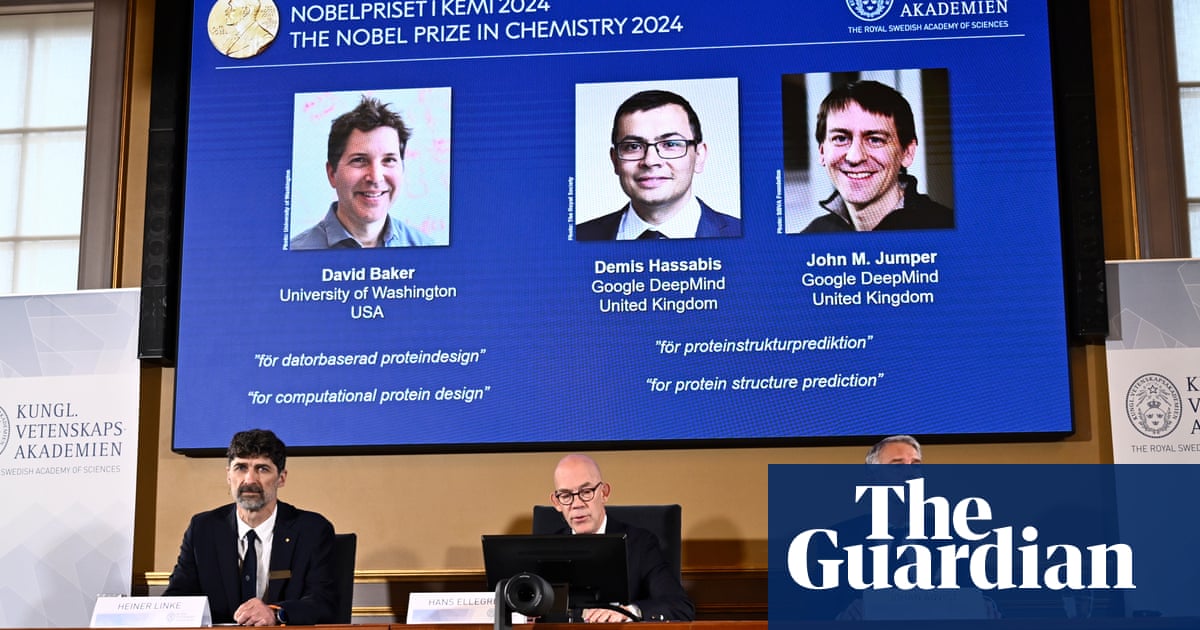DeepMind Researchers and Biochemist Awarded Nobel Prize in Chemistry

Groundbreaking Achievements in Protein Science Awarded 2024 Nobel Prize in Chemistry
Two prominent scientists from Google DeepMind, along with an esteemed American biochemist, were recently awarded the Nobel Prize in Chemistry for their significant contributions to understanding and designing protein structures. This recognition highlights their efforts in computational protein design and the groundbreaking technology that has emerged from their research.
The Nobel Prize Recipients
Demis Hassabis and John Jumper
The first half of this prestigious award went to Demis Hassabis, co-founder of DeepMind, and John Jumper, who played a vital role in developing the AI model AlphaFold. This innovative model is capable of predicting protein structures based on their amino acid sequences, revolutionizing how scientists approach protein design.
David Baker
The other half of the prize was awarded to Professor David Baker from the University of Washington. His extensive computational research led to the creation of entirely new proteins, which hold great promise for various applications, including vaccines, nanotechnology, and miniaturized sensors.
Announcement and Initial Reactions
The winners were announced by the Royal Swedish Academy of Sciences in Stockholm. Each recipient will share a prize of 11 million Swedish kronor (approximately £810,000). Upon learning about their win, both Hassabis and Jumper expressed their disbelief, noting they only discovered their achievement moments before the official announcement. Hassabis remarked on the honor of receiving the Nobel Prize, emphasizing his lifelong commitment to utilizing AI for societal benefit.
The Vision of New Proteins
During a press meeting following the announcement, David Baker elaborated on the concept of creating new proteins, which started as a dream over 20 years ago. He acknowledged that advancements in computing and scientific knowledge have made this dream a reality, enabling significant contributions to medical science, such as designing innovative coronavirus vaccines. Baker expressed his excitement about the potential of engineering proteins that could address some of humanity’s pressing challenges in the 21st century.
Key Discoveries and Their Significance
Heiner Linke, chair of the Nobel Committee for Chemistry, highlighted two main achievements recognized this year:
- The Art of Building Spectacular Proteins: One of the groundbreaking discoveries involves constructing impressive new proteins.
- Predicting Protein Structures: The other significant achievement fulfills a 50-year goal of predicting protein structures solely based on amino acid sequences.
These advancements open up vast possibilities for future scientific research and applications.
Understanding Proteins
Proteins play a vital role in sustaining life by governing all chemical reactions within living organisms. They act as hormones, antibodies, and are fundamental building blocks for various tissues. Baker’s aim has always been to engineer proteins that do not exist in nature, a mission he successfully embarked on in 2003. Since then, research in his lab has produced proteins with a wide array of purposes in both medicine and materials science.
The Prediction Challenge
Proteins are made up of 20 different amino acids arranged in complex sequences that fold into unique three-dimensional structures. These structures dictate how proteins function and interact within the body, especially in therapeutic contexts, like drug binding. The “prediction problem” of determining a protein’s three-dimensional shape from its sequence has puzzled scientists since the 1970s. Progress was slow, and the task appeared daunting.
Breakthrough with AlphaFold 2
The significant breakthrough came four years ago with the introduction of AlphaFold 2, an AI model created by Hassabis and Jumper. This advancement leveraged deep learning techniques to address the complex nature of biological systems. As a result, researchers can now predict the structure of nearly all known proteins, totaling around 200 million. Since its launch, AlphaFold 2 has been utilized by over two million users worldwide in various fields, including tackling antibiotic resistance and inventing enzymes to break down plastics.
Responsible Innovation in AI
Hassabis views AlphaFold not only as a testament to the transformative power of AI in scientific discovery but also as a reminder of the dual nature of such technologies. While AI has the potential to greatly benefit society, there are inherent risks involved. He emphasized the importance of focusing on positive applications while being vigilant about misuse.
Dr. Annette Doherty, president of the Royal Society of Chemistry, remarked on the remarkable benefits of this research, suggesting it will inspire future generations much like past Nobel laureates have.






